In this blog post, we will explore a tackle problem many borrowers face – Mortgage Denied After Pre-Approval. The landscape of qualifying for a residential mortgage loan has undergone significant changes in recent years, presenting distinctions from past processes.
Despite obtaining pre-approval, instances of mortgage denied after pre-approval persist, leaving many borrowers needing clarification. It’s noteworthy that over 80% of our clients at Gustan Cho Associates have encountered last-minute mortgage loan denials from other lenders, often attributed to the imposition of overlays by the lender.
Getting a mortgage denied after pre-approval causes stress not just to home buyers, but home sellers and their families. Last minute mortgage loan denial also causes stress for loan officers, realtors, and third-party mortgage and real estate professionals.
As long as the loan officer does their due diligence and qualifies borrowers correctly, there is no reason for a mortgage denied after pre-approval. Loan officers need to understand both the federal guidelines and their company’s lender overlays.
What Is The Main Reason For Mortgage Denied After Pre-Approval By Underwriters?
The number one reason for a mortgage denied after pre-approval is because loan officers issued pre-approval to borrowers without properly qualifying borrowers. A loan officer should not sign off on a pre-approval letter. All pre-approvals at Gustan Cho Associates are fully underwritten and signed off by our mortgage underwriters.
All our pre-approvals result from comprehensive credit approvals endorsed by our underwriters. At Gustan Cho Associates, every mortgage pre-approval undergoes a thorough TBD PROPERTY UNDERWRITING APPROVAL process.
Gustan Cho Associates will know whether a borrower will close a loan or not once the borrower orders the credit report and we run the automated underwriting system and get findings.
Gustan Cho Associates stands out for having no lender overlays on government and conventional loans. We strictly adhere to the automated underwriting system’s findings. While many lenders may grant an approve/eligible status through the automated underwriting system, they often reject the loan due to additional lender overlays that surpass the minimum agency mortgage guidelines. This is why we successfully closed 100% of our pre-approvals.
Denied After Being Told You Were “Pre-Approved”? Don’t Give Up Yet
A denial in underwriting doesn’t always mean you can’t buy a home
Qualifying For Home Loans Today
Following the real estate and credit crisis in 2008, the mortgage industry experienced a substantial transformation. Major players like Fannie Mae, Freddie Mac, FHA, VA, USDA, and portfolio mortgage lenders established updated lending guidelines, including new government-mandated minimums.
Gustan Cho Associates are mortgage brokers licensed in 48 states including Washington, DC, Puerto Rico, and the U.S. Virgin Islands. We have a network of 210 wholesale mortgage lenders with hundreds of non-QM mortgage loan programs available.
In the aftermath of the crisis, numerous mortgage lenders shuttered their operations. Those who weathered the challenges of the Great Recession focused more on avoiding risky loans than facilitating successful ones. Unfortunately, this shift in approach has led to situations where individuals may experience the distressing scenario of mortgage denied after pre-approval.
Countless people faced bankruptcy or foreclosure due to business closures and job losses, causing severe repercussions across industries.
Non-QM and Subprime Mortgage Loan Options
Mortgage denied after pre-approval remains a common issue, with some industries facing extinction following the 2008 Great Recession. Numerous mortgage loan programs, including no-doc, DSCR, and stated income options, were discontinued during that period. However, a resurgence has occurred, particularly in NON-QM Loans.
No-doc loans, DSCR mortgages, 1099 mortgage loans, stated income mortgages, asset-depletion loans, and bank statement loans are becoming increasingly popular among self-employed borrowers and homebuyers with irregular income.
One notable development is the rise of Bank Statement Mortgages, introduced just last year and especially popular among self-employed individuals. The crucial factors influencing mortgage qualification include income, credit history, and debt-to-income ratios. It’s important to note that being denied a mortgage by one lender does not preclude approval by another, as different lenders may have varying mortgage overlays. Subsequent paragraphs will elaborate on why certain lenders may approve borrowers when others cannot.
Minimum Mortgage Lending Guidelines
There are two types of mortgage lending guidelines.
- The first is the minimum mortgage lending guidelines set by Fannie Mae, Freddie Mac, VA, USDA, and HUD ( For FHA loans).
- The second type of mortgage guidelines is called mortgage lender overlay.
Mortgage Overlays are lending guidelines that surpass the minimum federal lending guidelines and vary from mortgage lender to lender. Lenders can set much tougher lending requirements or overlays than the minimum required.
Not All Lenders Have The Same Mortgage Guidelines
Despite meeting the minimum federal mortgage guidelines, numerous individuals receive the disheartening news of having their mortgage denied after pre-approval. The issue often lies in the specific requirements set by the lender, known as overlays, which go beyond the federal guidelines.
Many borrowers who fulfill the minimum agency mortgage criteria might still face denial from a particular mortgage company due to these lender-specific overlays. Regrettably, some lenders attribute the rejection to the borrowers needing to meet their internal requirements rather than the federally mandated minimum guidelines. This discrepancy can lead to clarity and satisfaction for applicants.
What Are Lender Overlays By Mortgage Companies?
If borrowers experience a mortgage denied after pre-approval from a particular lender, it is essential to investigate the reasons behind the denial. Whether it is due to the lender’s overlays or a failure to meet federal guidelines, exploring alternatives like Gustan Cho Associates, which operates without overlays, is crucial in navigating through the challenges of mortgage approval. Understanding the factors contributing to the denial is key for informed decision-making in the mortgage application process.
Pre-Approved Then Denied? Get a Second Opinion From True Experts
Reach out today and let us issue a fully documented pre-approval after your loan was denied in underwriting
Federal Guidelines Compared To Lender Overlays
We will use a few examples of why so many borrowers are told they do not qualify for home loans.
Minimum credit score requirement for FHA Loan
Minimum credit scores to qualify for a 3.5% down payment. FHA minimum credit score requirement under federal guidelines imposed by HUD is 580. Many lenders, especially banks, require a minimum credit score of 640 even though HUD only requires 580. This is due to their overlays on credit scores. If borrowers are told they do not qualify for a mortgage due to having credit scores under 640, then go elsewhere where lenders do not have overlays on credit scores. There are plenty of mortgage companies with lender overlays that will welcome under 600 credit score borrowers.
HUD Debt-To-Income Ratio Guidelines on FHA Loans
The maximum debt-to-income ratios allowed by HUD to get approve/eligible per AUS on FHA loans is 46.9% front-end DTI and 56.9% back-end DTI. Many lenders will have overlays on debt-to-income ratios. Many lenders, especially banks, will cap the back-end debt-to-income ratios to 45% DTI. Some will go as low as 43% or lower depending on the mortgage lender. Borrowers told they do not qualify for a mortgage due to high debt-to-income ratios, and go elsewhere. There are plenty of lenders with no overlays that will be ecstatic to have the business
HUD Guidelines on Collection Accounts on FHA Loans
HUD does not require borrowers to pay off the old collection and charged-off accounts. Borrowers can still qualify for FHA Loans without having to pay off old collection accounts with balances. However, many lenders will require that collection and charged-off accounts be paid
However, HUD does count 5% of the unpaid collection balance as a monthly liability. It will count as a monthly expense when calculating debt-to-income ratios. This is only on non-medical collection accounts with balances greater than $2,000. Medical collection accounts with credit balances are exempt from this rule.
Borrowers are told they need to pay off all of their collection account balances or get denied for a mortgage loan due to unpaid collection accounts, then go elsewhere. Paying outstanding collections and charged-off accounts is not required by HUD. There are banks where that will not even look at borrowers with collection accounts, whether paid or unpaid, in the previous 4 years
Conventional Loans
The minimum credit score requirement to qualify for a conventional loan is 620. However, many lenders will not accept any conventional mortgage loan applicants with credit scores under 680 as part of their lender overlays.
Gaps in Employment
Many lenders, especially banks and credit unions, will require borrowers to be employed with the same company for at least two years. They also do not allow gaps in employment in the past two years. This is not a Fannie Mae nor a HUD mortgage lending guideline. Borrowers can have gaps in employment and still qualify for a mortgage loan.
For borrowers who have been unemployed for six months or less and get a new job, then 30-day paycheck stubs will be required in order for you to close a mortgage loan. Verification of employment will also be required to make sure that the likelihood of continuous employment is likely.
Overlays On Gaps In Employment
One of the big reasons for mortgage denial after pre-approval by some lenders is that they have overlays in employment gaps. Some lenders will average two years of income when many times it is not necessary. Other lenders do not allow gaps in employment by borrowers: If borrowers have been unemployed or not working for six or more months, federal mortgage guidelines require that they be employed full-time for a period of six or more months before they can qualify.
How Long Is Too Long of a Gap in Employment?
Frequently asked question we get asked at Gustan Cho Associates is how long is too long of an employment gap? Dale Elenteny, a senior loan officer at Gustan Cho Associates explains:
If you took two or three months between jobs, it’s usually not considered an employment gap but rather a job searching period. However, stretch that period to nine or ten months and most employers would consider that a full-fledged employment gap. Can I get a job after 5 year gap? Though getting a job after a long gap and no experience is difficult but not impossible. You can attend walk-in interviews, some companies don’t consider the year of passing. If you have good skills (which I am not sure you would have after such a long gap), you can start working as a freelancer.
They can have been out of work for a year or more. Homebuyers can qualify for a mortgage as long as they have been employed in a full-time job for 6 or more months on a new job with a prior extended gap in employment.
Underwriter Found Issues Your Loan Officer Missed?
Contact Gustan Cho Associates and we’ll go line-by-line through your file to see what went wrong and how to fix it
Can You Have Multiple Jobs in The Past Two Years and Qualify For a Mortgage?
Homebuyers will be eligible to qualify for a mortgage loan with multiple gaps in employment in the past two years. All mortgage applicant needs to provide a 2-year work history. If a mortgage loan applicant has been employed in a new job for six months and has been unemployed for two years, they need to provide one and one-half years of job history prior to the time before their unemployment status started.
Borrowers can have a gap in employment in the past two years to qualify for a mortgage. Many borrowers are under the impression they need to be on the same job for the past two years. This is not the case. The mortgage lender needs a two-year job history. It does not need to be a job history with no gaps. A two-year residential history is required as well.
Over 80% of our borrowers at Gustan Cho Associates are folks who could not qualify at other lenders or have gotten a mortgage denial after pre-approval. We have no overlays on government and conventional loans. All of our pre-approvals are full credit loan commitments that are fully underwritten and signed off by our mortgage underwriters.
Mortgage Lenders For Bad Credit and Manual Underwriting
We are experts in helping borrowers with under 600 credit scores and manual underwriting. Borrowers who have gotten mortgage denial after pre-approval can easily transfer their FHA and/or VA Home Appraisals so they are not stuck with another appraisal fee. Borrowers who have gotten their Mortgage Denied After Pre-Approval, please contact us so we can help. There should be no reason for a Mortgage Denied After Pre-Approval. The main reason for a Mortgage Denied After Pre-Approval is due to the loan officer not properly qualifying the borrower initially.
FAQ – Mortgage Denied After Pre-Approval By Underwriters
- Why do borrowers face mortgage denial after pre-approval, despite obtaining pre-approval from a lender? Instances of mortgage denial after pre-approval persist due to various factors, often linked to lender overlays. Over 80% of clients at Gustan Cho Associates have encountered last-minute denials, frequently attributed to the imposition of overlays by lenders.
- How does a last-minute mortgage loan denial impact different parties involved in the homebuying process? Mortgage denials cause stress for homebuyers, home sellers, their families, as well as loan officers, realtors, and other professionals in the mortgage and real estate industry.
- What is the main reason for mortgage denial after pre-approval by underwriters? The primary reason for mortgage denial after pre-approval is the issuance of pre-approval without proper borrower qualification. At Gustan Cho Associates, all pre-approvals undergo thorough underwriting, ensuring a comprehensive credit approval process.
- What sets Gustan Cho Associates apart in the mortgage approval process? Gustan Cho Associates stands out for conducting fully underwritten pre-approvals, relying on comprehensive credit approvals endorsed by their underwriters. This approach eliminates last-minute denials and contributes to a 100% closure rate on pre-approvals.
- How has the mortgage industry transformed after the real estate and credit crisis in 2008? Following the crisis, major players in the mortgage industry updated lending guidelines, leading to significant changes. Gustan Cho Associates, licensed in 48 states, operates as mortgage brokers with a network of 210 wholesale mortgage lenders.
- What are non-QM and subprime mortgage loan options, and how have they evolved? Mortgage denial after pre-approval remains a challenge, especially after the 2008 crisis. While certain mortgage loan programs were discontinued, there has been a resurgence, particularly in non-QM loans, including options like no-doc loans, DSCR mortgages, and stated income mortgages.
- What are lender overlays, and how do they impact mortgage approval? Lender overlays are specific requirements set by mortgage lenders that surpass the minimum federal guidelines. Understanding the distinction between federal guidelines and lender overlays is crucial in navigating the challenges of mortgage approval.
- Why might borrowers be told they do not qualify for home loans despite meeting minimum federal guidelines? Borrowers may face denials due to lender-specific overlays that surpass federal guidelines. Some lenders impose additional requirements while fulfilling minimum agency mortgage criteria, leading to mortgage denied after pre-approval.
- Can different lenders have varying mortgage guidelines even when meeting federal criteria? Yes, despite meeting minimum federal mortgage guidelines, lenders may have varying overlays. Borrowers experiencing mortgage denial after pre-approval should explore alternatives like Gustan Cho Associates, known for operating without overlays.
- What are some examples of lender overlays affecting mortgage qualification? Examples include credit score requirements, debt-to-income ratios, treatment of collection accounts, and employment history. Lenders may impose overlays that differ from federal guidelines, affecting borrower eligibility.
This blog on Mortgage Denied After Pre-Approval was updated on February 13, 2024.
Denied Over Lender Overlays, Not Real Guidelines?
Call 800-900-8569 and let us restructure your loan with no overlays after being denied post–pre-approval


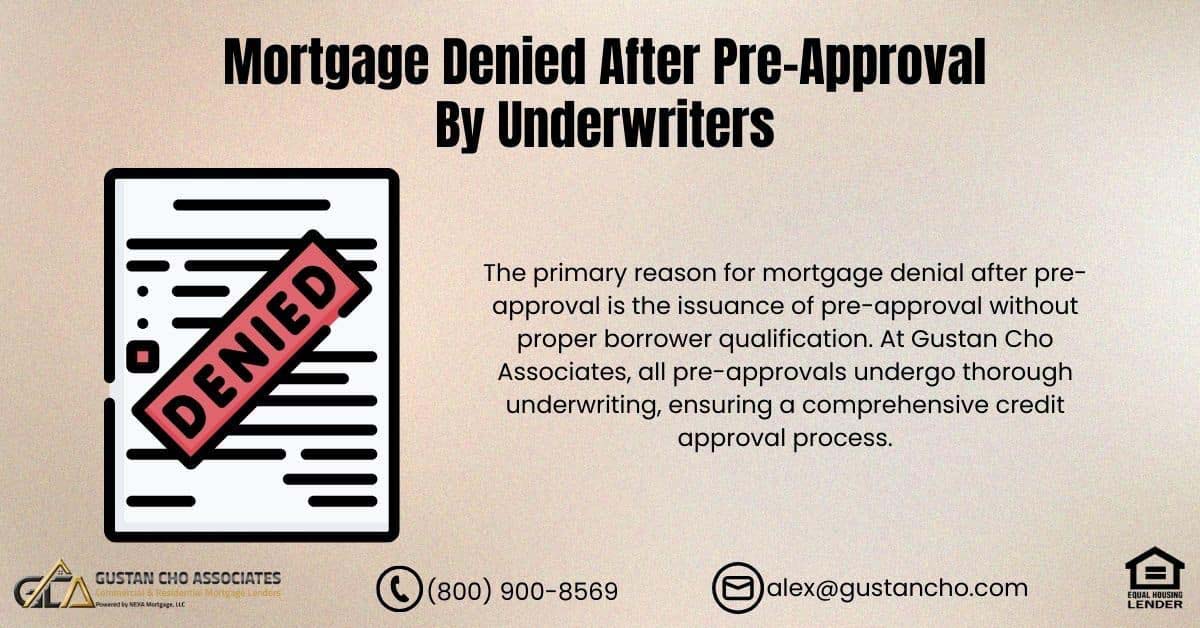




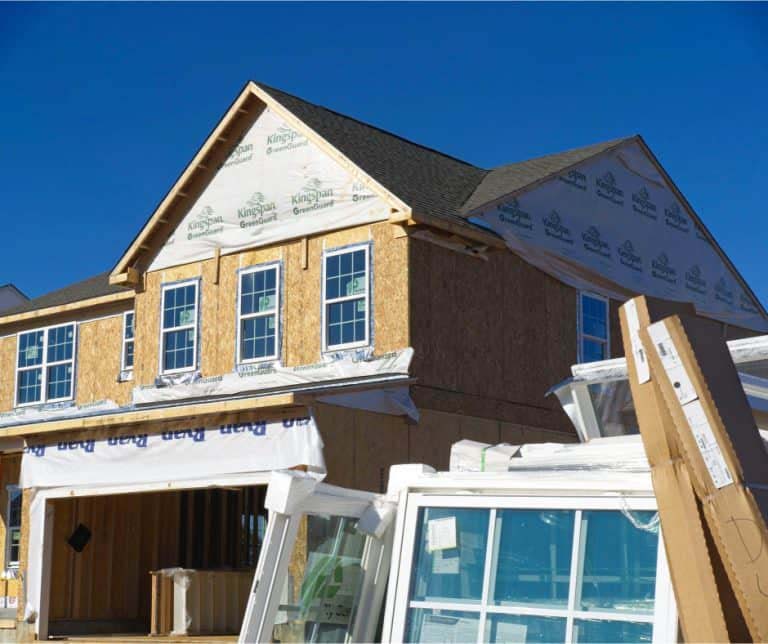
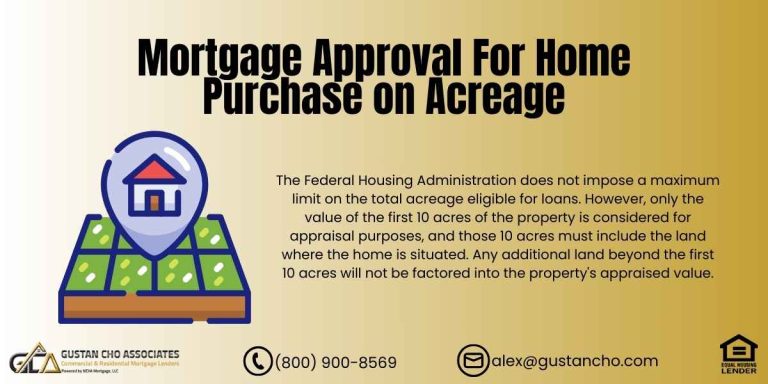
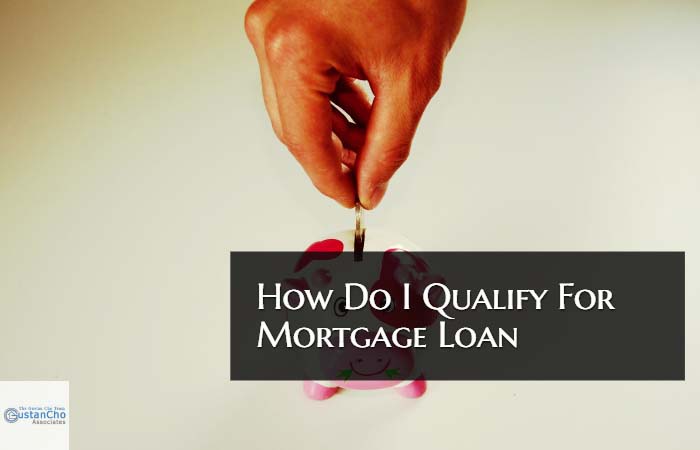
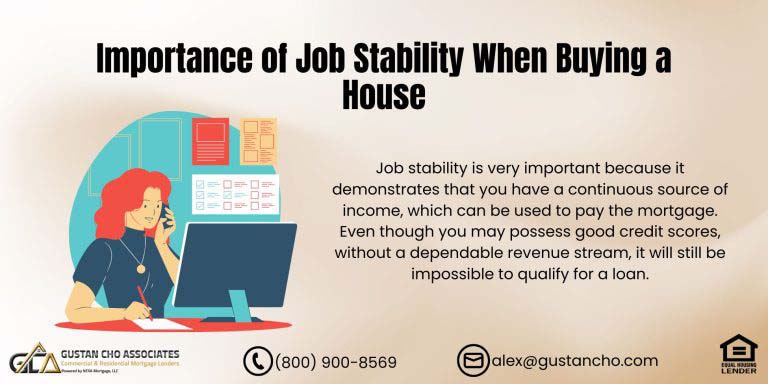
I want to use an analogy to explain the gratitude I have to Michelle McCue of Gustan Cho Associates for helping me get qualified and approved for a mortgage. There was once a blind man who had so fine a sense of touch that, when any animal was put into his hands, he could tell what it was merely by the feel of it. One day the cub of a wolf was put into his hands, and he was asked what it was. He felt it for some time and then said, “Indeed, I am not sure whether it is a wolf’s cub or a fox’s: This is exactly the type of reassurance Michelle McCue of Gustan Cho Associates has given me from the first time we communicated. I want to thank Michelle McCue and the team at Gustan Cho Associates for making the dream of homeownership possible and come true. Michelle McCue and The team at Gustan Cho Associates are true angels at heart.